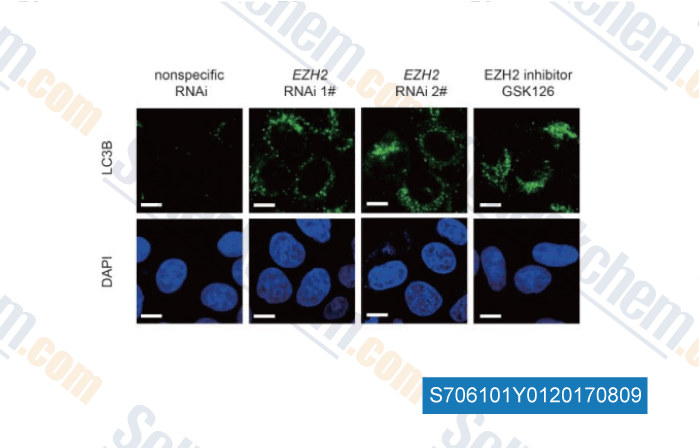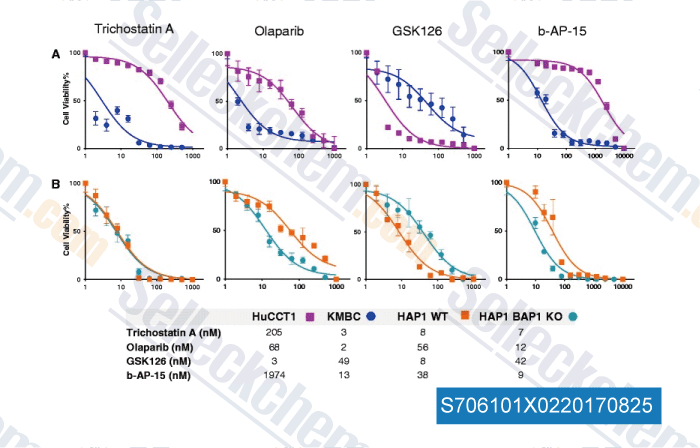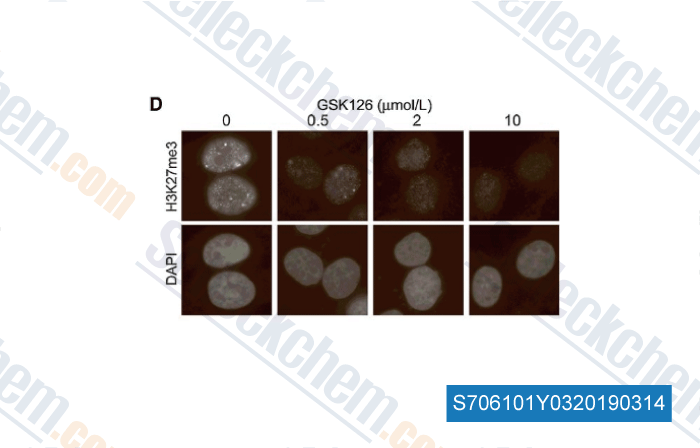|
How to Cite 1. For In-Text Citation (Materials & Methods): 2. For Key Resources Table: |
||
|
Toll Free: (877) 796-6397 -- USA and Canada only -- |
Fax: +1-832-582-8590 Orders: +1-832-582-8158 |
Tech Support: +1-832-582-8158 Ext:3 Please provide your Order Number in the email. We strive to reply to |
Technical Data
| Formula | C31H38N6O2 |
||||||
| Molecular Weight | 526.67 | CAS No. | 1346574-57-9 | ||||
| Solubility (25°C)* | In vitro | DMSO | 5 mg/mL (9.49 mM) | ||||
| Ethanol | 4 mg/mL (7.59 mM) | ||||||
| Water | Insoluble | ||||||
| In vivo (Add solvents to the product individually and in order) |
|
||||||
|
* <1 mg/ml means slightly soluble or insoluble. * Please note that Selleck tests the solubility of all compounds in-house, and the actual solubility may differ slightly from published values. This is normal and is due to slight batch-to-batch variations. * Room temperature shipping (Stability testing shows this product can be shipped without any cooling measures.) |
|||||||
Preparing Stock Solutions
Biological Activity
| Description | GSK126 (GSK2816126A, GSK2816126) is a potent, highly selective EZH2 methyltransferase inhibitor with IC50 of 9.9 nM, >1000-fold selective for EZH2 over 20 other human methyltransferases. | ||
|---|---|---|---|
| Targets |
|
||
| In vitro | In vitro, GSK126 most potently inhibits H3K27me3, followed by H3K27me2 in both EZH2 wild-type and mutant DLBCL cell lines. This compound also effectively inhibits the proliferation of EZH2 mutant DLBCL cell lines, and induces transcriptional activation of EZH2 target genes in sensitive cell lines. [1] In A687V EZH2-mutant cells, this treatment results in a global decrease in H3K27me3, robust gene activation, caspase activation, and decreased proliferation. [2] In parental H2087 cells, it inhibits the expression of VEGF-A and phosphorylated Ser(473)-AKT, and thus causes the inhibition of cell proliferation, migration and metastasis. [3] | ||
| In vivo | In mice bearing KARPAS-422 and Pfeiffer xenografts, GSK126 (150 mg/kg/d, i.p.) decreases global H3K27me3, increases gene expression, and thus causes marked tumour regression. [1] |
Protocol (from reference)
| Kinase Assay: |
|
|---|---|
| Cell Assay: |
|
| Animal Study: |
|
References
|
Customer Product Validation
![<p>(C) Four GCBDLBCL cells lines [1 wild-type (wt), 3 mutated (mut) EZH2] were treated with 500 nmol/l BAY 1238097 or with an EZH2 inhibitor (DZNep and GSK126, both used at the concentration of 500 nmol/l) as single agents and in combination for 72 h. The arrow indicates the EZH2 correct band. Dimethyl sulphoxide (DMSO) alone was added as negative control cells. Membranes were hybridized with antibodies against EZH2, H3K27me3, histone H3 and GAPDH.</p>](https://file.selleckchem.com/downloads/review/700px/GSK126-S706101W0120170825.gif)
-
, , Br J Haematol, 2017, 178(6):936-948

-
Data from [ , , Autophagy, 2015, 11(12):2309-22. ]

-
Data from [ , , Mol Cancer, 2017, 16(1):22 ]

-
Data from [ , , Mol Cancer Res, 2018, 16(3):417-427 ]
Selleck's GSK126 Has Been Cited by 191 Publications
| FAK signaling suppression by OCT4-ITGA6 mediates the effectively removal of residual pluripotent stem cells and enhances application safety [ Theranostics, 2025, 15(14):7127-7153] | PubMed: 40585989 |
| Crosstalk between chromatin state and ATM signalling in DNA damage-induced transcription stress [ EMBO J, 2025, 10.1038/s44318-025-00537-7] | PubMed: 40859031 |
| Differential regulation of FADS2 by EZH2 reveals a metabolic vulnerability in ovarian cancer treatment [ EBioMedicine, 2025, 119:105879] | PubMed: 40818202 |
| Chromatin modification abnormalities by CHD7 and KMT2C loss promote medulloblastoma progression [ Cell Rep, 2025, 44(5):115673] | PubMed: 40393452 |
| EZH2 inhibition sensitizes MYC-high medulloblastoma cancers to PARP inhibition by regulating NUPR1-mediated DNA repair [ Oncogene, 2025, 44(6):391-405] | PubMed: 39562655 |
| Epigenetic reprogramming via EZH2 inhibition rescues fibroadipose pathogenesis in secondary lymphedema through activating PPARγ signaling [ J Orthop Translat, 2025, 55:309-322] | PubMed: 41079990 |
| BRAFV600E maintains the CpG island methylator phenotype, and DNA methylation of PRC2 targets genes in colon cancer [ iScience, 2025, 28(7):112905] | PubMed: 40678543 |
| Inhibiting EZH2 complements steroid effects in Duchenne muscular dystrophy [ Sci Adv, 2025, 11(11):eadr4443] | PubMed: 40085707 |
| Suppressed macrophage response to quorum-sensing-active Streptococcus pyogenes occurs at the level of the nucleus [ bioRxiv, 2025, 2025.02.07.637189] | PubMed: 39975246 |
| Protocol for differentiating cardiomyocytes and generating engineered heart tissues from human feeder-free extended pluripotent stem cells [ STAR Protoc, 2025, 6(1):103576] | PubMed: 39893639 |
RETURN POLICY
Selleck Chemical’s Unconditional Return Policy ensures a smooth online shopping experience for our customers. If you are in any way unsatisfied with your purchase, you may return any item(s) within 7 days of receiving it. In the event of product quality issues, either protocol related or product related problems, you may return any item(s) within 365 days from the original purchase date. Please follow the instructions below when returning products.
SHIPPING AND STORAGE
Selleck products are transported at room temperature. If you receive the product at room temperature, please rest assured, the Selleck Quality Inspection Department has conducted experiments to verify that the normal temperature placement of one month will not affect the biological activity of powder products. After collecting, please store the product according to the requirements described in the datasheet. Most Selleck products are stable under the recommended conditions.
NOT FOR HUMAN, VETERINARY DIAGNOSTIC OR THERAPEUTIC USE.
